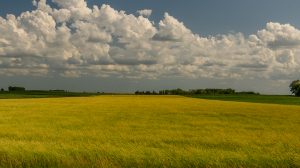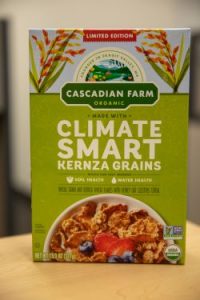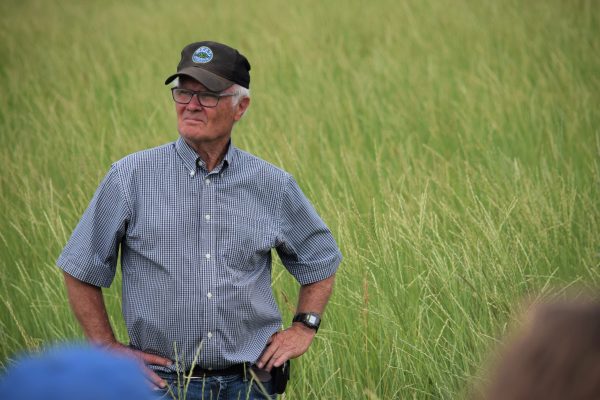Perennial Promise Growers Cooperative formed to increase production of Kernza® as a way to build soil health, preserve water sources, mitigate climate change, and revive rural communities
Organic and conventional farmers may not agree on farming practices but in Minnesota they are finding common ground on the value of Kernza perennial intermediate wheatgrass. Twenty-five organic and conventional farmers in the state recently joined together to form the Perennial Promise Growers Cooperative to increase production of Kernza and bring the grain’s significant environmental and food production benefits to more Americans.
The motivation to establish the co-op was to preserve the value of Kernza, says Carmen Fernholz, co-op president and an organic farmer in Madison, Minnesota.
“As I was watching this Kernza Project develop, I thought about how to keep it from being just another grain like corn or soybeans and ending up out of the control of the people we really want to benefit from it,” he says. “And that’s what got me to think about organizing farmers to figure out how we can protect it.”
Two-thirds of the cooperative’s 25 members are organic farmers and one-third are conventional, and Fernholz expects more to join.
“I’m thinking there will be more, as more people become familiar with Kernza and see how it can fit in their operations,” he says.

Field of Kernza intermediate wheatgrass.
Fernholz and a neighbor grow 200 acres of Kernza. There are about 2000 acres of the crop grown in Minnesota, which accounts for the majority of the 3661 acres grown nationwide, according to the website Kernza.org.
“Mind blowing” soil health benefits
Developed by the Land Institute in partnership with the University of Minnesota’s Forever Green Initiative, Kernza intermediate wheatgrass offers a new paradigm in agriculture. Unlike food crops such as corn, soybeans, and wheat, which are planted, grown, and harvested every year, Kernza is planted once and produces harvests over multiple years. Because it’s not planted every year, there is no disruption to the soil. Its extensive root system—as long as 10 feet—helps reduces soil erosion and increases organic matter in the soil. It increases water infiltration to help protect surface water from runoff and sediment. Kernza provides green cover on fields year-round to build soil health and sequester carbon to mitigate climate change. Research by the University of Minnesota found that Kernza planted near wells reduced nitrate contamination from cornfields by 96% and 86% from soybean fields.
Luke Peterson, Carmen Fernholz’s organic farming partner and fellow co-op member, says Kernza’s soil health benefits are “mind blowing.”
“It breaks up (soil) compaction, increases water holding capacity, helps microbial life in the soil, attracts beneficial insects. It’s a crop that can move our farm to being more and more regenerative.”
Jade Estling, one of the co-op’s conventional farmer members in Roosevelt, Minnesota, has been growing Kernza since 2014.
“With spring flooding, and higher rainfall events, we like to grow Kernza as filter strips to reduce soil erosion, and we still have an economic benefit besides just ecological,” he says.
Building go-to marketing strategy for Kernza
Perennial Promise Growers Cooperative aims to find markets for Kernza.
“With new crops, farmers may be interested in growing them but may be hesitant because they don’t know if there’s a market for them,” Fernholz says. “That was one of the primary reasons for putting together the co-op so that we could work together and find the markets.”
The cooperative hired a marketer, Alex Heilman, director of supply and trade at Mad Agriculture, a Colorado-based group that is encouraging adoption of regenerative agriculture practices.
“We want to build a go-to marketing strategy for Kernza with value aligned buyers who want to get access to this new perennial crop for its product development benefits and also for the ecosystem services,” Heilman says.
There are a handful of large and medium size companies looking to incorporate Kernza into different products, though Heilman says these are at a very early stage.
“Our goal is to drum up interest and develop pilot programs within some of these larger companies to really educate consumers about Kernza,” he says.

Cascadian Farm’s new Kernza cereal
Kernza is already found in a growing number of foods including flours, cereals, baked goods, and crackers, as well as beers. Patagonia Provisions sells three Kernza “Long Root” beers. General Mills’ subsidiary Cascadian Farm recently launched a Climate Smart Kernza Grains cereal at Whole Foods. Baker’s Field Flour & Bread in Minneapolis and Madison Sourdough in Madison, Wisconsin are using Kernza flour in baked goods. Meadowlark Organics in Ridgeway, Wisconsin is growing Kernza and milling it into flour. Columbia County Bread and Granola in Pennsylvania developed a sprouted Kernza flour cracker. Perennial Pantry, in Burnsville, Minnesota, has built a business around selling Kernza flours, whole grains, and waffle and pancake mixes.
“We have a whole class of small and mid-scale bakeries coming online that are incorporating Kernza into their blends,” says Colin Cureton, who handles supply chain development for Kernza at Forever Green.
Doubling supply every year for five years
To meet the growing demand for Kernza, the supply of the grain needs to increase. Cureton says the supply can double every year for five years to 100,000 or 150,000 acres, which compared to millions of acres of corn and soybeans is still a small amount.
Still, Cureton says: “When you talk about doubling a crop every year for five years, that’s really significant growth.”
That’s where the Perennial Promise Cooperative can play a key role. They aim to attract more farmers to grow Kernza and work with the Forever Green Initiative to advance the agronomic attributes and seed genetics of Kernza.
Forever Green released the first commercial Kernza seed variety, MN-Clearwater, in 2019. Three seed companies, Albert Lea Seed, Minnesota Native Landscapes, and Brownseed Genetics are now licensed to sell the seed.
But the resulting plants now produce seeds that are just one-third the size of wheat seeds, which makes harvesting a challenge. Forever Green seed breeders are working on the next Kernza seed line, which could have a 20% larger seed size and increase yields by 8%.
Perennial Promise Cooperative farmers will work with researchers at Forever Green providing feedback from the field that researchers can use to improve Kernza.
“The co-op is a critical partner in ensuring that we’re really delivering on that social and economic value proposition,” Cureton says.
Fernholz has a similar vision of the co-op’s partnership with Forever Green.
“We want the co-op to work closely with the University of Minnesota so that they can get us the genetics, and we can get them the information they need on the best ways to grow, harvest, and sell Kernza.”
“Promise to restore soil health, repopulate rural communities”
Kernza supporters see great potential for the crop as a climate change solution and a way to help rebuild rural America.
“Climate impacts are one of the biggest challenges of this day and age, and we have this perennial crop that has so many of these beneficial climate mitigation impacts associated with it,” Heilman says. “And this is a huge opportunity to drive additional economic opportunities for developing rural communities.”
Cureton compares the growth of Kernza to the development of solar energy, which was more expensive than coal for many years. But as the technology advanced solar became cheaper and is now being widely adopted.
“Kernza and continuously living cover is very similar,” he says. “It’s a broad scale sustainability transition, and a major sector of the economy that we need to speed up. We want to do it intelligently, but there’s a strong case to be made that this crop could deliver benefits to soil, water, and climate.”
According to Fernholz, that’s the promise of the Perennial Promise Growers Cooperative.
“We look at Kernza’s promise to help restore soil health and get water quality back to where it needs to be. And if we protect that value, we can repopulate the rural landscape and communities.”









